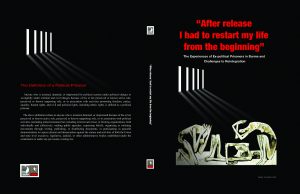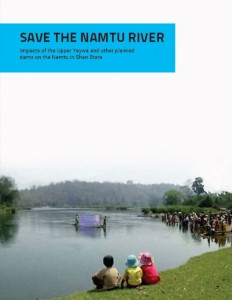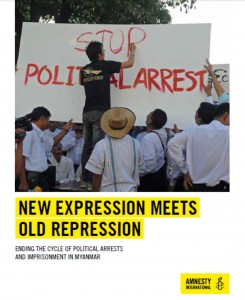Human Rights (383 found)
Report of the United Nations High Commissioner for Human Rights: Situation of human rights of Rohingya Muslims and other minorities in Myanmar
The present report, submitted pursuant to Human Rights Council resolution 29/21, examines the situation of human rights of Rohingya Muslims and other minorities in Myanmar […]
• • •Torture, extrajudicial killing, and use of civilians as human shields by Burma Army during new offensive against SSPP/SSA near Upper Yeywa dam site in Kyaukme
During May 2016, the Burma Army has committed grave human rights violations, which meet the definition of war crimes, during a new offensive against the Shan State Progress Party/Shan State Army (SSPP/SSA) in Kyaukme township, northern Shan State, close to the Upper Yeywa dam site on the Namtu/Myitnge river […]
• • •“After release I had to restart my life from the beginning” The Experiences of Ex-political Prisoners in Burma and Challenges to Reintegration
 Since 1962, between 7,000 and 10,000 political prisoners have been imprisoned in Burma. Whilst a multitude of anecdotal records exist, there is very little comprehensive data concerning the torture and mistreatment experienced by political prisoners within Burma’s interrogation centers and jails […]
Since 1962, between 7,000 and 10,000 political prisoners have been imprisoned in Burma. Whilst a multitude of anecdotal records exist, there is very little comprehensive data concerning the torture and mistreatment experienced by political prisoners within Burma’s interrogation centers and jails […]
Multiple forces in the Divide, An Update on Karen 7th Brigade Region
Once one of the strongest regions in Burma for the Karen National Liberation Army (KNLA), the area around KNLA 6th Brigade now stands as one of the most divided […]
• • •Burma Army expansion, abuses along Kokang-China border creating scores of “ghost villages”
Burma Army expansion and ongoing abuses since last year in mountainous areas along the Kokang-China border is making it impossible for tens of thousands of Kokang refugees to return home, according to interviews carried out by SHRF in March 2016 […]
• • •Burma: Country Reports on Human Rights Practices for 2015
Burma has a quasi-parliamentary system of government in which national parliament selects the president and constitutional provisions grant one-quarter of national, regional, and state parliamentary seats to active-duty military appointees […]
• • •Save The Namtu River
 In January 2016, Burma’s state media reported that Naypyidaw was proceeding with four new hydropower dams on the Namtu (Myitnge or Dokhtawaddy) River, three of which are in conflict areas of Shan State […]
In January 2016, Burma’s state media reported that Naypyidaw was proceeding with four new hydropower dams on the Namtu (Myitnge or Dokhtawaddy) River, three of which are in conflict areas of Shan State […]
Opium Production Spreads to Chin State
Free Burma Rangers (FBR) recently finished a mission to document opium production in Chin State, Burma. Chin State is not widely known in Burma for its production of opium […]
• • •Myanmar: Political imprisonment in numbers
Today, Amnesty International released the report New expression meets old repression. Here is a look at some of the key numbers behind the growing crackdown on freedom of expression in Myanmar […]
• • •Myanmar: New expression meets old repression: Ending the cycle of political arrests and imprisonment in Myanmar
 This is the summary of the Amnesty International report which highlights the pattern of politically motivated arrest and imprisonment since the start of 2014. Since it came to power in March 2011, the government in Myanmar has embarked on a major transition from five decades of authoritarian military rule towards a more open political system […]
This is the summary of the Amnesty International report which highlights the pattern of politically motivated arrest and imprisonment since the start of 2014. Since it came to power in March 2011, the government in Myanmar has embarked on a major transition from five decades of authoritarian military rule towards a more open political system […]

 All posts
All posts